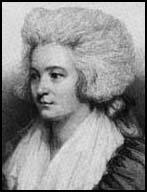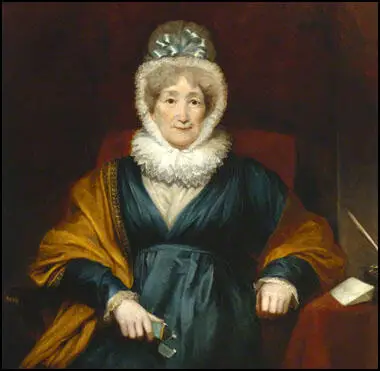Hannah More

Hannah More, the fourth of the five daughters of Jacob More (1700–1783) and Mary Grace, was born on 2nd February 1745 at Fishponds, a couple of miles north of Bristol. Her father was a schoolmaster at the local school.
Her biographer, S. J. Skedd, has pointed out: "Hannah More grew up in a loving, intellectual, and predominately female environment. A precocious child and the acknowledged genius of the family, she displayed a quick-witted cleverness and passion for learning which were nurtured not only by her scholarly father, who taught her Latin and mathematics, but also by her mother and sisters."
Jacob More started his own boarding-school at 6 Trinity Street in Bristol. Hannah and her sisters attended the school. She also attended classes at the Bristol Baptist Academy. Later she taught at her father's school. In her late teens Hannah More composed her first significant work, a pastoral verse drama for schoolgirls entitled The Search after Happiness (1762) where she expressed her views on women's education.
In 1767 More accepted a proposal of marriage from William Turner, of Belmont House, Wraxall. Turner, who was twenty years her senior, postponed their wedding three times; on the first occasion he allegedly jilted her at the altar. More finally broke off their engagement in 1773. It has been claimed that this decision "triggered a nervous breakdown". Soon afterwards she resolved never to marry, and refused several subsequent proposals, including one from the poet John Langhorne. Turner offered her an annuity to enable her to pursue a literary career. She initially declined but finally accepted a smaller annuity of £200. This money gave her financial security and independence.
More was a regular visitor to London where she met David Garrick, Joshua Reynolds, Samuel Johnson, and Edmund Burke. In September 1774 she helped Burke in his successful campaign to be elected MP for Bristol. Garrick put on her first play, The Inflexible Captive, at the Theatre Royal in Bath in April 1775. This was followed by her second play, Percy, that was performed at Covent Garden in December 1777. It was a great success and she made nearly £600 from the rights to the play. Her third and final play, The Fatal Falsehood, was far less popular and played for only a few nights.
In 1777 More published Essays on Various Subjects, Principally Designed for Young Ladies. The eight essays dealt with topics such as education and religion. She suggested that schools should stress "the intellectual, sentimental, and religious education of girls" and argued that women were "one of the principal hinges on which the great machine of human society turns".
More met Charles Middleton and his wife at his home at Barham Court, Teston. She was later introduced to John Newton, William Wilberforce, Thomas Clarkson and Granville Sharp and became in their campaign against the slave-trade. More wrote: "I tell him (Middleton) I hope Teston will be the Runnymede of the Negroes, and that the great charter of African liberty will be there completed." In January 1788, she wrote the poem, Slavery, to help publicize Wilberforce's proposed measures against the trade.
In August 1789 Wilberforce stayed with her at her cottage in Blagdon, and on visiting the nearby village of Cheddar and according to William Roberts, the author of Memoirs of the Life and Correspondence of Mrs. Hannah More (1834): they were appalled to find "incredible multitudes of poor, plunged in an excess of vice, poverty, and ignorance beyond what one would suppose possible in a civilized and Christian country". As a result of this experience, More rented a house at Cheddar and engaged teachers to instruct the children in reading the Bible and the catechism. The school soon had 300 pupils and over the next ten years the More sisters opened another twelve schools in the area where the main objective was "to train up the lower classes to habits of industry and virtue".
Michael Jordan, the author of The Great Abolition Sham (2005) has pointed out: "More set up local schools in order to equip impoverished pupils with an elementary grasp of reading. This, however, was where her concern for their education effectively ended, because she did not offer her charges the additional skill of writing. To be able to read was to open a door to good ideas and sound morality (most of which was provided by Hannah More through a series of religious pamphlets); writing, on the other hand, was to be discouraged, since it would open the way to rising above one's natural station."
S. J. Skedd has argued: "More was adamant that the poor should not be taught writing, as it would encourage them to be dissatisfied with their lowly situation; over twenty years later she strongly criticized the National Society for teaching their school pupils the three Rs." Skedd goes onto argue that "the sisters also started evening classes for adults, weekday classes for girls to learn how to sew, knit, and spin, and a number of women's friendly societies, where the virtues of cleanliness, decency, and Christian behaviour were inculcated." Later these schools were handed over to Selina Mills, the future wife of Zachary Macaulay.
Richard S. Reddie has suggested that More was greatly influenced by the ideas of William Wilberforce: "More formed a friendship with William Wilberforce and became the living embodiment of his task to reform manners. If Wesley and the Methodists appeared to concentrate their work on the poor, Hannah More focused on the wealthy farmers and landowners, many of whom were known for their penchant for carousing. With the help of local clergy, she encouraged them to to curb their excessive drinking and coarse behaviour in favour of a more sedate, spiritual existence."
The historian, Linda Colley, described Hannah More in her book, Britons: Forging the Nation 1707-1837 (1992) as "push, humourless and complacent and could be unctuously sycophantic where influential men were concerned, whether they were politicians, peers, ecclesiastics or cultural lions such as Samuel Johnson and David Garrick".
More's campaign against the slave-trade associated her with the French Revolution. She complained to Charles Moss, the Bishop of Bath and Wells: "It has been broadly intimated that I have laboured to spread French principles; and one of my schools is specifically charged with having prayed for the success of the French... I am accused of being the abettor, not only of fanaticism and sedition, but of thieving and prostitution." These charges were untrue as she was a strong opponent of democracy.
More was concerned about the influence of Tom Paine, whose book, Rights of Man, was circulating in cheap editions, throughout Britain. In 1792 she published Village Politics: Addressed to all the Mechanics, Journeymen, and Day Labourers, in Great Britain (1792). The book attempted to ridicule Paine's political ideas. This was followed by a series of pamphlets on political issues for the lower classes. These were published anonymously as Cheap Repository Tracts (1795–8). The successful banker, Henry Thornton, helped pay for these publications. It has been claimed that within a year these pamphlets sold over 2 million copies. They were mainly bought by the wealthy to distribute to the poor. The success of these publications paved the way for the establishment of the Religious Tract Society.
Hannah More's book, Strictures on the Modern System of Female Education (1799), was a great success with seven editions being printed in the first year alone. In her book she criticised the ideas of Jean-Jacques Rousseau and Mary Wollstonecraft. She argued that her belief in female rights, encouraged women to adopt an aggressive independence.

More joined the Clapham Set, a group of evangelical members of the Anglican Church, centered around Henry Venn, rector of Clapham Church in London. This inspired the writing of Practical Piety (1811), Christian Morals (1813) and Character and Practical Writings of St Paul (1815). More also became concerned about the growing influence of William Cobbett and his newspaper, The Political Register. Her attack on Cobbett appeared in The Loyal Subject's Political Creed (1817). Cobbett responded by describing More as an "old bishop in petticoats". In 1820 she wrote: "These turbulent times make one sad. I am sick of that liberty which I used so to prize".
Hannah More died, aged eighty-eight, on 7th September 1833. She left over £30,000, most of which she bequeathed to charities and religious societies. Linda Colley has argued that "More had become the first British woman ever to make a fortune with her pen."
Primary Sources
(1) Hannah More, Slavery (1788)
I see, by more than Fancy's mirrow shewn,
The burning village, and the blazing town:
See the dire victim torn from social life,
The shrieking babe, the agonizing wife!
She, wretch forlorn! is dragg'd by hostile hands,
To distant tyrants sold, in distant lands!
Transmitted miseries, and successive chains,
The sole sad heritage her child obtains!
Ev'n this last wretched boon their foes deny,
To weep together, or together die.
By felon hands, by one relentless stroke,
See the fond links of feeling nature broke!
The fibres twisting round a parent's heart,
Torn from their grasp, and bleeding as they part.
Hold, murderers, hold! not aggravate distress;
Respect the passions you yourselves possess.
(2) Hannah More, Practical Piety (1811)
The ingenuity of self-love is inexhaustible. If people extol us, we feel our good opinion of ourselves confirmed. If they dislike us, we do not think the worse of ourselves, but of them; it is not we who lack merit, but they who lack true insight. We persuade ourselves that they are not so much insensible to our worth, as jealous of it. There is no shift, stratagem, or device which we do not employ to make us stand well with ourselves.
The great, the only effectual antidote to self-love is to get the love of God and of our neighbor firmly rooted in the heart. Yet let us ever bear in mind that dependence on our fellow creatures is as carefully to be avoided as love of them is to be cultivated. There is none but God on whom the principle of love and dependence form but a single duty.

